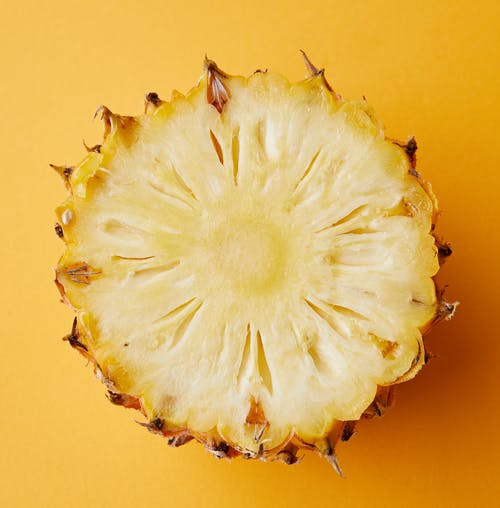IVF Superstitions: Pineapple Core, French Fries, and Others

Originally published 01/28/2021. Updated for accuracy and relevancy on 10/06/2023.
By Halle Tecco, MBA, MPH
If you are on an IVF journey, you may have heard of a few IVF traditions like eating french fries after a transfer. How did these old wives’ tales come about, and do they actually work? Let’s dive into the most common IVF traditions and superstitions.
Pineapple for IVF
If you haven’t noticed, the pineapple is the unofficial symbol of IVF. [1] A quick search for IVF gear on Etsy returns a plethora of socks, journals, and other gifts all adorned by this friendly-looking fruit (which just so happens to also be a symbol of southern hospitality in Natalist’s homebase, Charleston, SC). [2]
Folklore has it that it’s good luck to eat pineapple before an embryo transfer. Why is that? Research suggests that bromelain, an enzyme mixture present in the pineapple, is an anti-inflammatory agent. [3] This could possibly help with embryo implantation, but there’s no research to back that up. Dr. Tomer Singer, a reproductive endocrinologist told the New York Times that “there’s no evidence in the literature that says consuming pineapple prior to an embryo transfer will improve implantation.” [1]
That being said, pineapple is a safe, healthy choice, so there’s no harm in chowing down!
IVF Socks

If you look around at the feet of fellow patients in the waiting room, you may notice cute socks being adorned. There is no evidence that wearing warm socks improves IVF outcomes, but it sure does make the procedures more comfortable. I opted for cute socks that I’d want to wear for years to come. But you can find a plethora of IVF-related socks (with sperm, eggs, cute sayings, etc.) all over the internet.
French Fries After IVF Transfer
Eating french fries after a transfer has become a tradition. It’s unclear how it started, but it likely spun out of advice for women at risk for OHSS (ovarian hyperstimulation syndrome). Some providers advise women at high risk of OHSS to eat a high-sodium and high-protein diet after their retrieval. And McDonald’s fries check both of those boxes. [4]
This one is a personal choice. If you are at risk for OHSS, you should definitely follow your doctor’s nutritional advice. If they suggest something salty, know that there are options other than french fries (popcorn? edamame? kettle chips?). But if french fries are your thing, then by all means you deserve them!
Do you have a favorite superstition or tradition for embryo transfer that was not on our list that you swear by? We’d love to hear about it! Email us at team@natalist.com.
What Else Can Improve IVF Success?
What does the research actually suggest when trying to improve IVF success? There is no secret supplement, mantra, or food that will guarantee success, but there are ways to support your fertility and potentially improve your chances of conceiving. Keep in mind that there are many different factors at play when it comes to fertility and successful IVF, including age, male and female fertility, underlying conditions, etc.
What we do know is that maintaining a healthy lifestyle is one simple way to support your fertility. This means eating a balanced and healthy diet, maintaining a healthy weight, and avoiding damaging toxins from smoking or other illicit drug use. Many providers also recommend starting a prenatal vitamin or CoQ10 supplement to support egg health and early fetal development. Don't forget- sperm health is important too! Supplements like CoQ10 and Male Prenatal Vitamins can benefit sperm health, which may improve IVF success. [5-7] Make sure to talk with your provider before adding any new supplements to your regimen.
Up next:
- Preparing for IVF: 10 Things I Bought For My Egg Retrieval
- The IVF Funnel: Understanding Your Chances of Success
- Supplements to Take During Fertility Treatments and IVF
References:
- How Pineapple Became the icon of I.V.F. October 2019. The New York Times. https://www.nytimes.com/2019/10/02/style/pineapple-in-vitro-fertilization-pregnancy.html
- Southern Hospitality: The Significance Of The Pineapple in Charleston. Charleston Photography Tours. January 2017. https://www.charlestonphotographytours.com/blog/2017/1/9/southern-hospitality-the-significance-of-the-pineapple-in-charleston
- Pavan R, Jain S, Shraddha, Kumar A. Properties and therapeutic application of bromelain: a review. Biotechnol Res Int. 2012;2012:976203. doi:10.1155/2012/976203
- Rodgers, A. Preventing ovarian hyperstimulation syndrome. Fertility Centers of Illinois. July 2020. https://www.fcionline.com/fertility-blog/preventing-ovarian-hyperstimulation-syndrome
- Dcunha R, Hussein RS, Ananda H, et al. Current Insights and Latest Updates in Sperm Motility and Associated Applications in Assisted Reproduction. Reprod Sci. 2022;29(1):7-25. doi:10.1007/s43032-020-00408-y
- Alahmar AT. The impact of two doses of coenzyme Q10 on semen parameters and antioxidant status in men with idiopathic oligoasthenoteratozoospermia. Clin Exp Reprod Med. 2019;46(3):112-118. doi:10.5653/cerm.2019.00136
- Ferramosca A, Zara V. Diet and Male Fertility: The Impact of Nutrients and Antioxidants on Sperm Energetic Metabolism. Int J Mol Sci. 2022;23(5):2542. Published 2022 Feb 25. doi:10.3390/ijms23052542
Reach Out, We're Here
Have questions about your order or products? For the speediest answer, check out our FAQ section. Need something else? Come find us below.
Please keep in mind our regular business hours; Monday-Friday, 9am-5pm CT.
Customer Support
support@natalist.com
Press Inquiries
media@everlyhealth.com
Business & Partnerships
team@natalist.com
Affiliates + Influencers
team@natalist.com
Job Openings
Careers Page
























